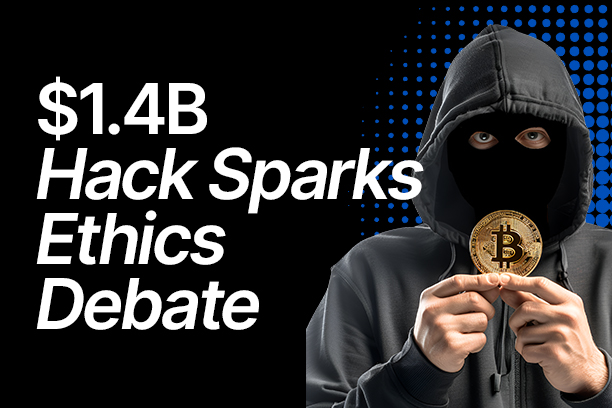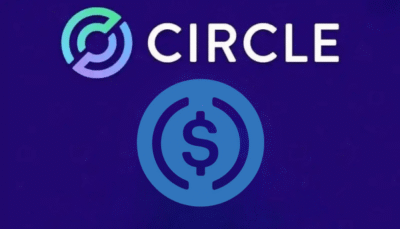A $1.4 billion crypto hack has sparked a major ethical debate, with Bybit and decentralized protocols (DAOs) caught in the middle. The North Korea-backed Lazarus Group is believed to be behind the attack, using DeFi platforms like Paraswap and ThorChain to move stolen funds.
Now, Bybit is pushing these DAOs to return the transaction fees they collected during the laundering process. This has raised bigger questions about whether decentralized platforms should take responsibility for financial crimes that happen on their networks.
Matthias, speaking on the latest CoinRock Show, summed up the dilemma:
“Is the road guilty because the robbers used it? That’s what Bybit is asking here. But in crypto, code is law, and that’s where things get tricky.“

Hack That Shook the Market
The Lazarus Group, a North Korean state-backed hacking organization, has pulled off some of the biggest crypto heists in history, stealing over $3 billion since 2017, according to Chainalysis. In their latest attack, they made off with $1.4 billion worth of ETH, making it one of the largest crypto thefts ever recorded. To cover their tracks, they used decentralized finance (DeFi) platforms, which don’t have central oversight or Know Your Customer (KYC) requirements.
In this case, DeFi platforms like Paraswap and ThorChain processed transactions tied to the stolen funds, moving them through liquidity pools and cross-chain bridges. These platforms automatically collected millions in transaction fees each time assets were swapped or transferred. Now, Bybit, one of the exchanges affected by the hack, is demanding that these DAOs return about $5 million in fees linked to the stolen funds.
Bybit argues that since the fees were earned from stolen assets, returning them is the right thing to do. But the DeFi community is split—some believe refunding the money could set a dangerous precedent that goes against DeFi’s core principles of immutability and decentralization.
Meanwhile, regulators like the U.S. Treasury and the Financial Action Task Force (FATF) are raising concerns about DeFi being used for illicit activity, with over $2 billion laundered through DeFi platforms in 2023 alone.
This situation has sparked a bigger debate: Should DeFi platforms take responsibility for criminal activity on their networks? How far should decentralization go? And will regulators start enforcing stricter rules on DeFi to prevent future hacks?
Should DAOs Return the Money?
Bybit’s request has split the crypto community into two opposing camps:
The Case for Returning the Money
- It’s the right thing to do: Many argue that DAOs should not profit from criminal activity, even if it is unintentional.
- Good for the industry: Returning the funds would set a precedent that crypto companies are willing to cooperate and self-regulate to prevent crime.
- Avoiding regulatory scrutiny: Governments are already cracking down on crypto. If DAOs refuse to return the money, it could attract harsher regulations on DeFi platforms.
The Case Against Returning the Money
- Code is law: DeFi is designed to be trustless and decentralized. The smart contracts that executed these transactions did exactly what they were coded to do—no rules were broken.
- It sets a dangerous precedent: If DAOs return the money now, where do they draw the line in the future? Should every transaction be manually reviewed for legitimacy?
- The fault lies with Bybit: The hack happened because of a security breach on Bybit’s end—why should DeFi platforms be held responsible for someone else’s security failure?
Matthias weighed in on the situation, stating:
“If DeFi platforms start reversing transactions, then are they really decentralized? The whole point of crypto is that the system runs on code, not on human judgment.”
Future Of DeFi And Regulation
This case has massive implications for the future of DeFi governance and regulation. Governments are already tightening their grip on crypto, and cases like this give regulators more ammunition to push for stricter controls over decentralized finance.
Some experts predict that this incident will accelerate the development of on-chain compliance solutions, where DAOs implement automated fraud detection rather than manual intervention. Others believe that centralized exchanges like Bybit will push for more collaboration between DeFi and regulatory bodies.
What Happens Next?
The decision now rests with the DAOs. If they return the funds, it could signal a new era of cooperation between DeFi and centralized platforms. If they refuse, it could reaffirm the principle that DeFi operates outside the control of traditional finance—for better or worse.
Regardless of the outcome, this case highlights the growing pains of the crypto industry as it navigates between decentralization, regulation, and ethical responsibility.
One thing is certain—the Bybit vs. DAO debate is far from over





